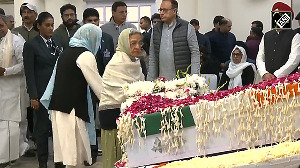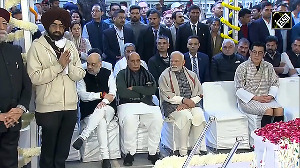"Well, obviously, the Pakistanis want to continue to have a good relationship with us. It's not going to be possible for us to have a civil nuclear relationship with Pakistan of the type that we've just announced with India. Because of history, because of their proliferation history," Under Secretary of State for Political Affairs Nicholas Burns told CBS channel's 'Charlie Rose Show.'
Burns' comment was an obvious reference to the global nuclear proliferation network carried out by the disgraced Pakistani nuclear scientist A Q Khan.
Burns also said India's military programme was never the focus of the landmark Indo-US civil nuclear agreement and brushed aside notions that it was meant to contain China.
"We never set out to arrange a deal that would roll back India's entire nuclear programme over the last 30 years, meaning the nuclear weapons programme. It was not meant to.
"This deal was meant to do one thing: Take the largest country in the world... which had been completely outside the international mainstream -- we had zero impact on its nuclear facilities. We did not have the ability to have any kind of strategic oversight over its nuclear programmes.
"And they will accept on the majority two-thirds of the nuclear programmes, international inspection. That's what we set out to do," said Burns, who played a crucial role in finalising the civil nuclear agreement.
On the notion that the deal was meant to contain China, Burns said, "Our relationship with China stands on its own. It's too powerful a country, too big a country that it can be contained. And we're certainly not establishing a relationship with India meant to be some kind of counterbalance to our relationship with China."
"We`ve got to have a good and productive relationship with China, a way to do business with them, a way to talk to them if we are going to achieve the ultimate goal, which is peace in Asia in the future," Burns said.
"But India is a rising power, as well as China. And what distinguishes India from China is its thoroughly democratic base. So India has the ability to promote that kind of peace and stability in Asia in the future," he said.
Questioned over possibility of India diverting civil nuclear supplies to strategic programme, he said, "I don't understand that argument. Right now, India has enough uranium, domestically, to build a much bigger strategic nuclear weapons programme. They are not doing that. India has a very modest nuclear weapons programme."
Burns also said the deal "has a lot of major ramifications to it and they're all positive."
"First of all, it's really India's coming of age. This is a country that has been a power in its own region, but has not sought to become a global power. But by virtue of its size -- a billion people, it is a democracy -- it now wants to exercise influence on a global basis. And I think this deal represents India's coming of age in that respect," Burns said.
"For us, for the Americans, it is a very important agreement, because we've had a relationship with India for 59 years, going back to partition and independence in 1947. It's always been an unfulfilled relationship," he said.





 © 2024 Rediff.com -
© 2024 Rediff.com -